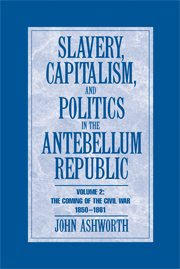Book contents
- Frontmatter
- Contents
- Acknowledgments
- Introduction: Explaining the Civil War (1)
- Part I Slavery versus Antislavery
- 1 Combating the weaknesses of slavery: Southern militants, 1850–1861
- 2 The antislavery challenge: The Republicans, 1854–1861
- Part II Polarisation and Collapse
- Conclusion: Explaining the Civil War (2)
- Appendix: A review of some major works on the reasons for Confederate defeat
- Index
2 - The antislavery challenge: The Republicans, 1854–1861
Published online by Cambridge University Press: 05 June 2012
- Frontmatter
- Contents
- Acknowledgments
- Introduction: Explaining the Civil War (1)
- Part I Slavery versus Antislavery
- 1 Combating the weaknesses of slavery: Southern militants, 1850–1861
- 2 The antislavery challenge: The Republicans, 1854–1861
- Part II Polarisation and Collapse
- Conclusion: Explaining the Civil War (2)
- Appendix: A review of some major works on the reasons for Confederate defeat
- Index
Summary
Introduction: The Republican party
In December 1859, in response to a request for some autobiographical information, Abraham Lincoln recorded that in the early 1850s he had been “losing interest in politics.” But then in 1854 came an event which, he recalled, “aroused me again.” The event was “the repeal of the Missouri Compromise,” brought about, of course, by the passage of the Kansas-Nebraska Act. It was this which renewed Lincoln's interest in politics, and which propelled him on a course that would lead to the White House within a mere seven years.
Lincoln was not alone in reacting so decisively to the repeal of the Missouri Compromise. Indeed others had been far more virulent in their opposition. One of the most dramatic and effective of all the attempts to combat it was launched by a manifesto signed by six antislavery Senators and Representatives but written primarily by Salmon P. Chase of Ohio which appeared as early as January 1854. The Appeal of the Independent Democrats went further than Lincoln would ever go in denouncing the measure. “We arraign this bill,” Chase wrote, “as a gross violation of a sacred pledge; as a criminal betrayal of precious rights; as part and parcel of an atrocious plot to exclude from a vast unoccupied region, immigrants from the Old World and free labourers from our own States, and convert it into a dreary region of despotism, inhabited by masters and slaves.”
- Type
- Chapter
- Information
- Slavery, Capitalism and Politics in the Antebellum Republic , pp. 173 - 336Publisher: Cambridge University PressPrint publication year: 2007



